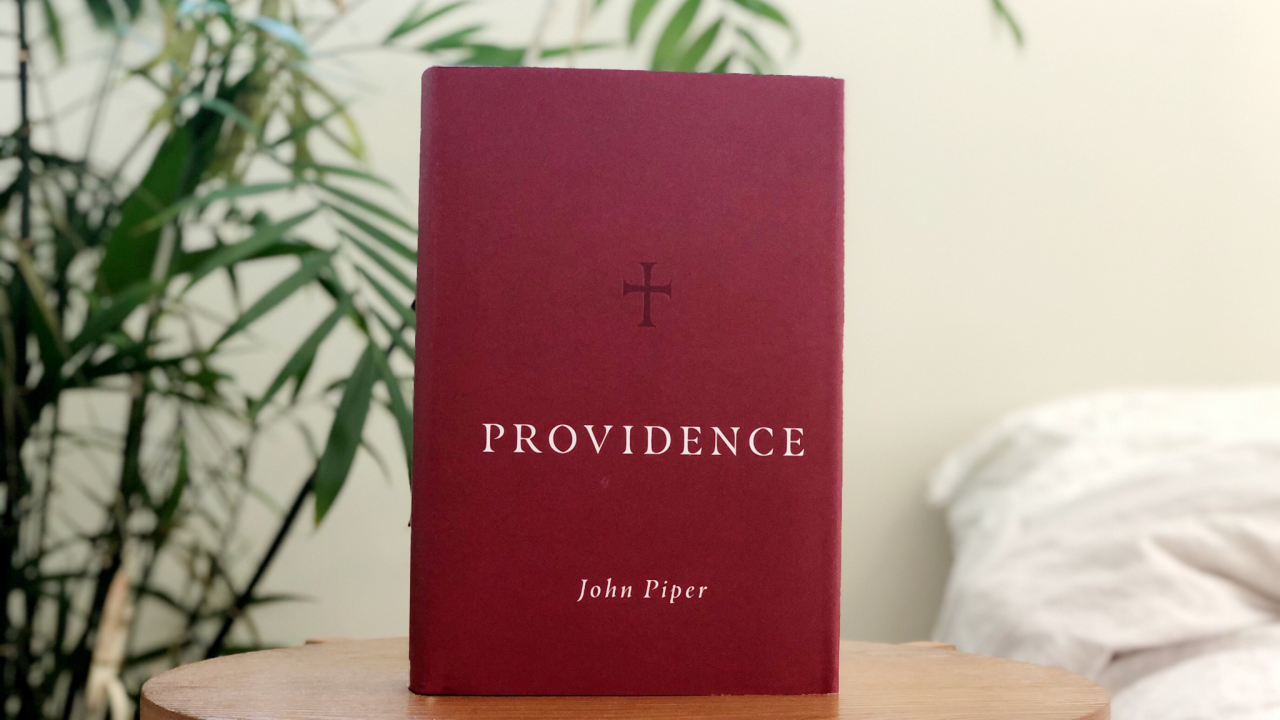Providence
At the beginning of the COVID-19 pandemic, Piper and Crossway released Coronavirus and Christ, offering six biblical answers to the question of how God is at work during this moment in history. It is fitting, towards the end of the pandemic, that Providence would be published. In this book, John Piper shows us how God’s purposeful sovereignty is to the praise of his glorious grace – past, present, and future.
God’s Ultimate Goal
In Part 1 and Part 2 of the book, Piper explains his definition of God’s providence as God’s purposeful sovereignty, and he shows us the goal to be God’s own glory. While discussing The Ultimate Goal of Providence in the History of Israel, Piper gives an overview of God’s people, and I was reminded that her history is my history – and it’s something to remember and reflect on.
One of my favorite leanings of Piper is his ability to make lists, and in Chapter 6: The Exodus Unfolds, he ponders the meaning of the name Yahweh (appearing in the Bible 6,800 times), built on the phrase “I am who I am” and pointing to God’s absolute being. He shares ten dimensions to its meaning, and it caused me to stop and worship.
Another great list appears in Chapter 21: Human Kingship and the King of Kings. Piper lists nine aspects of God’s providence over kings and nations. I am humbled, and also honored to know that our King is the King of the universe. This book gives great confidence for God’s people in Christ.
The Nature and Extent of Providence
In Part 3, Piper looks at the nature and extent of providence. Surprisingly, I was deeply moved when reading about God’s providence over nature. While I spend much time working with computers, Piper’s words brought me out of my world and into God’s good creation – his theatre of wonders.
There are so many great themes in this book. Adoption. Grace. Mercy. Glory. And we get some excellent signature phrases from Piper – progressive glorification, supreme satisfaction, and the global glory of God and the gladness of God’s people.
Piper presents a beautiful poem in The Stone and The Snake. It helps describe the paradox of Matthew 7:9-10 and Romans 8:28. While I am a daily reader at DesiringGod, this poem had escaped my memory. You can hear Piper read it as you follow along at the DesiringGod website.
The Reality of Death and the Resurrection of Jesus Christ
The reality of death and life as well as the resurrection of Jesus Christ is an important aspect of understanding God’s providence. In true Piper fashion, he opens the chapter on God’s providence over life and death with a “Bible bath” of verses to brace us for reality and help us breathe the fresh air of the curse of sin and the power of the cross.
Interestingly, Piper takes on the Declaration of Independence as it relates to God’s providence over life and death. He says that “we should not confuse a right to life in relation to other people with a right to life in relation to God. In relation to people, God himself has established that right. In relation to himself, he has not. We have no right to life in relation to God. God has absolute rights over our lives.” This type of clarity and critical thinking is a trademark of Piper, and it is found all throughout this book.
When looking at natural willing and human action, my breath was taken away to see God’s providence in the lives of Joseph, Moses, and Daniel. God had turned the hearts of kings and nations. It gave me confidence and trust towards what God was doing in my own life, work, and ministry.
Revealed Will and Sovereign Will
Piper carefully considers the revealed will and sovereign will of God. He is sensitive in saying that God’s providence reigns over wayward and disobedience children. In fact, Jesus said that the gospel would be a dividing line for families. This does not escape God’s control, and we are called to trust in his truth.
Natural ability and moral ability come into play as Piper ponders the salvation of infants who die. I am caused to repent of my worldliness as I think about the greatness of God. The entire book is soaked in Scripture, and you will find many reasons to pick it up, again and again, to study and see the works and wonders of God’s providence.
Towards the end of the book, Piper looks at the Arminian doctrine of “prevenient grace” versus the prevailing sanctifying providence of God. He also makes the connection between love, holiness, and happiness in God as our supreme treasure. This book is a modern masterpiece, with truths that belong in the hearts and minds of every Christian hedonist.
Fear and Tremble, Love and Worship
To look deeply into the heart and mind of God, to know and understand God’s providence and plans, is not a trivial thing. It is intensely scary, and we should do so with fear and trembling. With Piper as our guide, he carefully shows us that God is still good. After reading this book, I still fear and tremble at God’s providence, but I do so in adoration and worship. Jesus is our good shepherd and our King. And I love him so much more.
I received a media copy of Providence and this is my honest review. Find more of my book reviews and follow Dive In, Dig Deep on Instagram - my account dedicated to Bibles and books to see the beauty of the Bible and the role of reading in the Christian life. To read all of my book reviews and to receive all of the free eBooks I find on the web, subscribe to my free newsletter.
